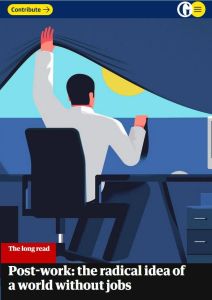Join getAbstract to access the summary!

Join getAbstract to access the summary!
Andy Beckett
Post-Work
The Radical Idea of a World Without Jobs
The Guardian, 2018
What's inside?
How would people live in a society without work?
Recommendation
Work means different things to different people: an economic necessity, a source of self-fulfillment, a status symbol or all of the above. Yet up until recently, few Westerners have questioned the value or necessity of work itself. This is now changing, as Andy Beckett explains in his article for The Guardian. He gives voice to a growing number of intellectuals and political activists who think that our work-centric society is becoming obsolete. In outlining some main lines of thinking within the emerging post-work movement, Beckett provides much food for thought for anybody interested in the future of work.
Summary
About the Author
Andy Beckett is a feature writer for The Guardian and author of Promised You a Miracle: Why 1980-82 Made Modern Britain.

















Comment on this summary